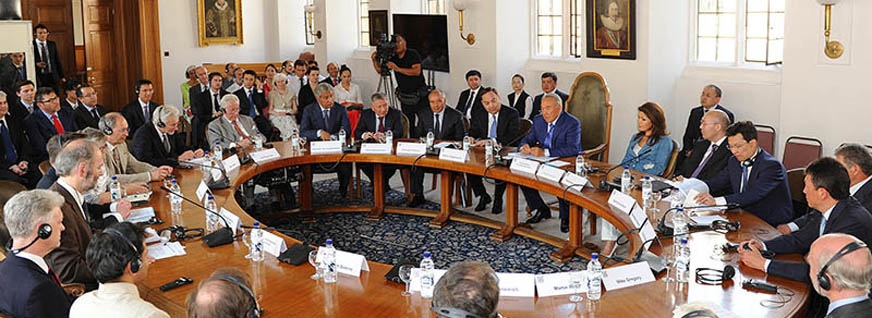
Opening the meeting, Nursultan Nazarbayev said that during many centuries Cambridge University has been one of the leading centers of world science and education and continues to make a significant contribution to the development of the modern world.
“It is a great honor for me to speak at such a respected university, whose graduates include a large number of outstanding personalities and Nobel Prize winners”, the President said.
The President shared his vision of the problems of today’s world and spoke about Kazakhstan’s role on the international stage and prospects for the country’s development. He said that the new millennium marked a time of profound change on the vast geo-strategic Eurasian space.
The President spoke about the necessity of sequenced reforms, focusing on economic liberalization followed by political liberalization
"Lack of political culture and experience have led to disrespect for state institutions and calls for violence. This is a very dangerous path for any country. This is confirmed by the clashes in Andijan, massive riots in Osh and events in Zhanaozen”, Nursultan Nazarbayev emphasized.
The President of Kazakhstan also noted in particular the need to further improve public administration system for effective socio-economic development of the country.
“Over the years of independence, GDP per capita in Kazakhstan has increased 16 times - from USD 700 to 12 000. From 1999 to 2007 GDP growth averaged 10% per year, and the country accounts for more than 80% of all the investments in Central Asia. The largest investors and top companies from Europe, Asia and America have come to our country”, Nursultan Nazarbayev said.
The Head of State also stressed that Kazakhstan has vast natural resources, not only oil and gas, but also all kinds of metals. At the same time, Kazakhstan is focusing on the task of economic diversification, and reducing dependency on oil exports and developing a modern industrial base as well as a self-generating system of innovation.
In 2010 Kazakhstan joined the European Cultural Convention and the Bologna Process. Since 1993 over 8,000 young Kazakhstanis have been educated at the world’s best universities at the state’s expense. The UK is one of the most popular places to study as part of this program.
Since 2001 the Kazakh-British Technical University has been in operation in Almaty, training and developing Kazakhstan’s national scientific and technological elite. The opening in Astana of the international Nazarbayev University is another priority project in the education field. Cooperation is developing with Cambridge University in educational programs.
At the meeting in Cambridge on July 26 Nursultan Nazarbayev announced the launch of the Central Asian Innovative Fund and the Al-Farabi Scholarship for talented students to carry out research on Central Asia at the University of Cambridge, and expressed confidence that it will be another contribution to co-operation.
"Last year I proposed creating a G-Global group of countries to complement the G20 format aimed at developing an international economic policy and identifying global anti-crisis solutions. G-Global is now a communicative platform established as an international virtual project with the Astana Economic Forum created by the “Eurasian Economic Club of Scientists“. Already the G-Global comprises more than 10,000 participants from nearly 150 countries. This initiative was supported by 14 Nobel Prize winners, the Committee for renewal of the Bretton Woods agreements, the Madrid Club, the European Commission and representatives of international organizations, business and scientific communities", Nursultan Nazarbayev said.
After the meeting Nursultan Nazarbayev visited Trinity College, one of the best-known colleges at Cambridge University.

